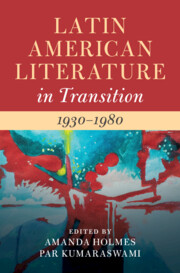Book contents
- Latin American Literature in Transition 1930–1980
- Latin American Literature in Transition
- Latin American Literature in Transition 1930–1980
- Copyright page
- Contents
- Contributors
- Introduction
- Part I War, Revolution, Dictatorship
- Part II Metropolis and Ruins
- Part III Solidarity
- Part IV Aesthetics and Innovation
- Chapter 14 Eros
- Chapter 15 The Return of the Galleons
- Chapter 16 “Un Híbrido de Halcón y Jicotea”
- Chapter 17 Literature and Revolution in Transition
- Chapter 18 Divergence and Convergence
- Chapter 19 Cortázar’s Transitional Poetics
- Index
- References
Chapter 18 - Divergence and Convergence
Avant-Garde Poetics in Twentieth-Century Spanish America and Brazil
from Part IV - Aesthetics and Innovation
Published online by Cambridge University Press: 24 January 2023
- Latin American Literature in Transition 1930–1980
- Latin American Literature in Transition
- Latin American Literature in Transition 1930–1980
- Copyright page
- Contents
- Contributors
- Introduction
- Part I War, Revolution, Dictatorship
- Part II Metropolis and Ruins
- Part III Solidarity
- Part IV Aesthetics and Innovation
- Chapter 14 Eros
- Chapter 15 The Return of the Galleons
- Chapter 16 “Un Híbrido de Halcón y Jicotea”
- Chapter 17 Literature and Revolution in Transition
- Chapter 18 Divergence and Convergence
- Chapter 19 Cortázar’s Transitional Poetics
- Index
- References
Summary
This chapter comparatively probes the distinct trajectories of avant-garde poetics in Spanish America and Brazil from the postwar to the 1980s. The 1920s and 1930s witnessed the rise of the Spanish American Vanguardias and Brazilian Modernismo, which adapted European experimental vocabularies to local contexts. Subsequently, a revival of the utopian avant-garde impulse developed into singular and divergent poetic forms of expression. This divergence can be clearly seen in, among other things, the preference in Brazil for synthetic forms and in Spanish America for the long poem. In other cases, the traditions converged in the adoption of an anti-lyrical stance, constructivist concerns, the use of long forms, and politically engaged poetry. From the 1970s on, the neo-baroque aesthetic also brought together figures from the entire region. This chapter looks at these divergences as well as points of confluence, seeking to understand how, in general, the reception of Surrealism and other poetic traditions led to a more “discursive,” personal poetry, and how the foregrounding of the materiality of language fueled synthetic, non-discursive forms.
Keywords
- Type
- Chapter
- Information
- Latin American Literature in Transition 1930–1980 , pp. 290 - 305Publisher: Cambridge University PressPrint publication year: 2022

